
Journal of Global Information Technology Management
Scope & Guideline
Exploring Trends, Inspiring Solutions.
Introduction
Aims and Scopes
- Global Information Technology Management:
The journal emphasizes the management of information technology on a global scale, exploring how businesses leverage IT to enhance performance, improve decision-making, and navigate cross-cultural challenges. - Impact of Digital Technologies:
A core focus is on the implications of digital technologies, including AI, big data, and e-commerce, on business practices, economic development, and societal change. - Cultural and Ethical Considerations:
The journal addresses the cultural implications of information technology, including how technology influences cultural heritage, ethical considerations in IT usage, and the role of technology in fostering inclusivity. - Interdisciplinary Perspectives:
Research published in the journal often takes interdisciplinary approaches, integrating insights from management, economics, sociology, and information systems to provide a holistic view of IT's role in global contexts. - The Role of Government and Policy:
The journal explores the influence of governmental policies and regulations on the adoption and diffusion of information technology across different countries and regions.
Trending and Emerging
- Artificial Intelligence and Education:
Recent articles emphasize the transformative potential of AI in educational contexts, suggesting a growing recognition of technology's role in reshaping learning experiences and accessibility. - Digital Transformation and Economic Growth:
There is an increasing focus on the relationship between digital transformation and economic growth, particularly in developing economies, underscoring the significance of ICTs in driving economic development. - Cultural Impacts of Technology:
Emerging research explores how digital technologies influence cultural practices and heritage, reflecting a heightened awareness of the intersection between technology and cultural identity. - Interdisciplinary Approaches to IT Management:
A trend towards interdisciplinary research is evident, with studies integrating insights from various fields such as sociology, psychology, and economics to better understand the multifaceted impacts of information technology. - Governance and Ethical Issues in Technology:
As concerns about privacy, data protection, and ethical implications of technology rise, there is a growing body of literature addressing governance frameworks and ethical considerations in IT management.
Declining or Waning
- Traditional IT Infrastructure Studies:
There has been a noticeable decline in research specifically focused on traditional IT infrastructure, as the field shifts towards topics related to cloud computing, digital transformation, and agile methodologies. - Focus on Localized Studies:
While localized studies were previously common, there is a decreasing emphasis on research that solely examines specific regional contexts without a global perspective, as the journal increasingly prioritizes international comparisons and implications. - Basic E-Commerce Adoption Models:
Research centered on basic models of e-commerce adoption is becoming less frequent, with a shift towards complex analyses that consider cultural, organizational, and technological factors in e-commerce. - Cybersecurity as an Isolated Topic:
The treatment of cybersecurity as a standalone issue is waning, as more recent publications integrate cybersecurity concerns within broader discussions of digital transformation and information governance. - Historical Analyses of IT Practices:
There is a reduction in publications that focus exclusively on historical analyses of IT practices, indicating a move towards more contemporary and forward-looking research in the field.
Similar Journals
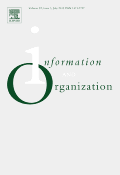
Information and Organization
Pioneering Research at the Intersection of Information and OrganizationInformation and Organization is a leading academic journal published by ELSEVIER SCI LTD, specializing in the dynamic fields of Information Systems, Library and Information Sciences, Management Information Systems, and Organizational Behavior. With an impressive Impact Factor that reflects its esteemed reputation, this journal enjoys a Q1 ranking in multiple categories, highlighting its significance in both research and practical applications. Established in 1996, the journal has paved the way for innovative research, fostering a community of scholars and practitioners who are dedicated to exploring contemporary challenges and opportunities in information management and organizational practices. While primarily available through subscription, the journal's impact resonates globally, making it an essential resource for researchers, professionals, and students eager to advance their knowledge and contribute to the evolving discourse in these crucial areas. With its rigorous peer-review process and a focus on cutting-edge topics, Information and Organization is committed to disseminating high-quality research that informs practice and policy, ensuring its critical role in shaping the future of information and organizational studies.
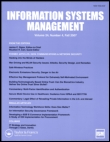
INFORMATION SYSTEMS MANAGEMENT
Leading the Way in Information Systems ResearchINFORMATION SYSTEMS MANAGEMENT is a premier academic journal published by Taylor & Francis Inc, focusing on the ever-evolving fields of Information Systems, Computer Science Applications, and Library and Information Sciences. With an impressive track record spanning over three decades since its inception in 1992, this journal is recognized in the top quartile (Q1) of its categories as of 2023, reflecting its influence and contribution to the research community. The journal holds commendable rankings in Scopus, positioned at #6 out of 280 in Library and Information Sciences, #44 out of 817 in Computer Science Applications, and #23 out of 394 in Information Systems, all showcasing its esteemed standing among peers. While the journal is not open access, it remains a vital resource for researchers, professionals, and students seeking to enhance their understanding of information systems management through high-quality, peer-reviewed articles that illuminate current trends, innovative technologies, and theoretical advancements in the field. With its dedicated commitment to scholarly excellence, INFORMATION SYSTEMS MANAGEMENT continues to be a leading platform for fostering knowledge dissemination and promoting academic dialogue.

Perspectivas em Ciencia da Informacao
Exploring the forefront of information research.Perspectivas em Ciencia da Informacao is a premier academic journal published by Universidade Federal de Minas Gerais, specifically from the Escola de Biblioteconomia. Since its inception in 2006, this Open Access journal has become a vibrant platform for disseminating research in the fields of Library and Information Sciences, Information Systems, Communication, and Museology. With a reputation bolstered by its classification in multiple quartiles—ranging from Q2 to Q4 in 2023—this journal stands out in the Brazilian academic landscape, providing valuable insights and supporting knowledge development for researchers, professionals, and students alike. Its impact is further underscored by its inclusion in Scopus, where it ranks within the lower percentiles of its categories, highlighting its potential for growth and increasing relevance in the scholarly community. The journal aims to explore emerging trends and significant issues in information science, facilitating an essential dialogue among scholars and practitioners to propel the field forward.
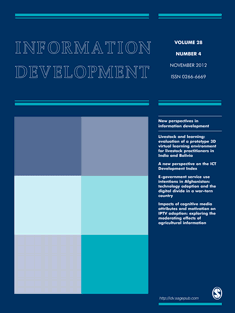
Information Development
Empowering Scholars in the Dynamic World of InformationInformation Development, published by SAGE Publications Ltd, is a prestigious journal focusing on the dynamic intersection of library science and information development. With an ISSN of 0266-6669 and an E-ISSN of 1741-6469, this journal has established itself as a critical resource for researchers, professionals, and scholars in the field since its inception in 1985. With a 2023 Q2 ranking in Library and Information Sciences and a commendable Scopus rank, falling within the 82nd percentile among its peers, the journal provides an invaluable platform for the dissemination of cutting-edge research and innovative practices. Notably positioned in the United Kingdom, the journal offers insightful explorations of contemporary challenges and advancements in information access, management, and policy. Although currently not an Open Access journal, it continues to contribute significantly to its field by fostering a robust academic dialogue and sharing knowledge essential for the evolution of library and information sciences. Scholars and practitioners alike are encouraged to engage with Information Development as it remains instrumental in navigating the complexities of today's information landscape.
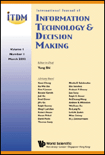
INTERNATIONAL JOURNAL OF INFORMATION TECHNOLOGY & DECISION MAKING
Advancing the Frontiers of Tech-Driven Decision MakingINTERNATIONAL JOURNAL OF INFORMATION TECHNOLOGY & DECISION MAKING, published by WORLD SCIENTIFIC PUBL CO PTE LTD, stands as a premier platform in the realm of computer science, focusing particularly on the intersection of information technology and decision sciences. Established in 2002, the journal has consistently published high-quality research, now recognized as a Q1 journal in Computer Science (miscellaneous) as of 2023, ranking 15th out of 133 in its category, which underscores its excellence and influence in the field. Although it does not currently offer Open Access options, the journal remains accessible to a broad audience of researchers, professionals, and students who seek to enhance their understanding of innovative decision-making methodologies powered by information technology. With an emphasis on interdisciplinary collaboration, this journal is dedicated to advancing theoretical and practical knowledge, making it an essential resource for anyone looking to stay at the forefront of technology-driven decision-making processes.
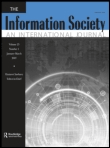
INFORMATION SOCIETY
Illuminating the Impact of Information on SocietyINFORMATION SOCIETY, published by Taylor & Francis Inc, stands at the forefront of interdisciplinary inquiry, bridging the realms of cultural studies, information systems, and political science since its inception in 1981. With a commendable impact factor and recognized as a Q1 journal in multiple categories, including Cultural Studies and Management Information Systems, it serves as a pivotal platform for researchers, professionals, and students seeking insights into the ever-evolving dynamics of information in society. The journal, indexed by Scopus and ranked highly in various disciplines, not only highlights key theoretical developments but also addresses applied practices in information management within cultural and political contexts. While access is subscription-based, the journal’s impact and relevance ensure it remains essential reading for those engaged in the critical exploration of information's role in contemporary and future societies.

International Journal of Enterprise Information Systems
Cultivating a Community of Enterprise InnovatorsThe International Journal of Enterprise Information Systems, published by IGI Global, stands as a pivotal resource for professionals, researchers, and students engaged with the evolving landscape of information systems and management. With an ISSN of 1548-1115 and E-ISSN 1548-1123, this peer-reviewed journal has been at the forefront of enterprise information research since its inception in 2005, recently achieving a commendable Q2 ranking in both Information Systems and Management and Management Information Systems categories in 2023. It also maintains a solid position in Computer Science Applications with a Q3 categorization. The journal thrives on its diverse scope, focusing on innovative applications and methodologies within information systems, making it crucial for advancing scholarly discourse. Although it does not offer an open-access model, its impactful research contributions, evidenced by a robust Scopus ranking—holding the 48th position in Decision Sciences and 43rd in Business Management—underscore its relevance and high-quality standards in the field. Published in the United States at IGI Global's Hershey headquarters, the journal aims to bridge theory and practice, fostering a vibrant research community dedicated to solving complex enterprise challenges.
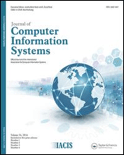
JOURNAL OF COMPUTER INFORMATION SYSTEMS
Pioneering Insights in Information Systems ResearchThe JOURNAL OF COMPUTER INFORMATION SYSTEMS, published by Taylor & Francis Inc, is a prestigious academic journal dedicated to the fields of computer science and information systems. With an ISSN of 0887-4417 and an E-ISSN of 2380-2057, this journal has been a valuable resource since its inception in 1995, contributing to the convergence of research until 2024. The journal holds significant status in its respective categories, achieving a Q2 ranking in Computer Networks and Communications, and a Q1 ranking in Education, demonstrating its impact and relevance to a broad academic audience. With Scopus rankings placing it in the 90th percentile for Social Sciences - Education and respectable standings in Computer Science, it serves as a critical forum for the dissemination of innovative research, methodologies, and case studies within the domains of computer information systems. Although not an open-access journal, it remains a highly cited source, attracting researchers, educators, and professionals seeking to enhance their knowledge and contribute to the evolving discourse in technology and education.
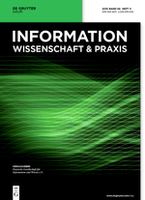
INFORMATION-WISSENSCHAFT UND PRAXIS
Exploring Innovative Solutions in Library and Information Sciences.INFORMATION-WISSENSCHAFT UND PRAXIS is a prominent academic journal dedicated to advancing the fields of Information Systems and Library and Information Sciences. Published by Walter de Gruyter GmbH in Germany, this journal serves as a crucial platform for researchers, professionals, and students to publish and access cutting-edge findings and discussions from the intersection of information science and practical applications. With an ISSN of 1434-4653 and E-ISSN of 1619-4292, it has maintained a steady course since its inception in 1997 and will continue to thrive through 2024. While currently categorized in the Q4 quartile of pertinent fields, it provides value by soliciting diverse perspectives and innovative research, albeit ranking within the lower percentiles in prominent databases such as Scopus. The journal's commitment to fostering discourse in the critical issues of information management and its impact on society is essential in this rapidly evolving digital era. Though not an open-access journal, the insights gleaned from its pages are vital for those invested in the future of information science. For interested contributors and readers, INFORMATION-WISSENSCHAFT UND PRAXIS stands as a beacon for ongoing research and practical enlightenment in its domain.
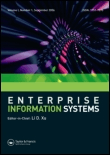
Enterprise Information Systems
Pioneering Research for the Digital Enterprise.Enterprise Information Systems, published by Taylor & Francis Ltd, is a prestigious academic journal dedicated to the dynamic field of information systems, emphasizing the intersection of technology and business processes. With a notable impact factor reflecting its significance in the scholarly community, the journal ranks in the Q2 category for Computer Science Applications and Q1 for Information Systems and Management as of 2023. Covering a broad scope from theoretical foundations to practical implementations, this journal serves as a crucial platform for disseminating cutting-edge research that enhances understanding of enterprise systems and their effective integration within organizations. Researchers, professionals, and students will find valuable insights in its pages, with contributions that shape the future of enterprise information systems. Established in 2007 and continuing through 2024, Enterprise Information Systems is essential for anyone looking to stay at the forefront of trends and advancements in this evolving field.